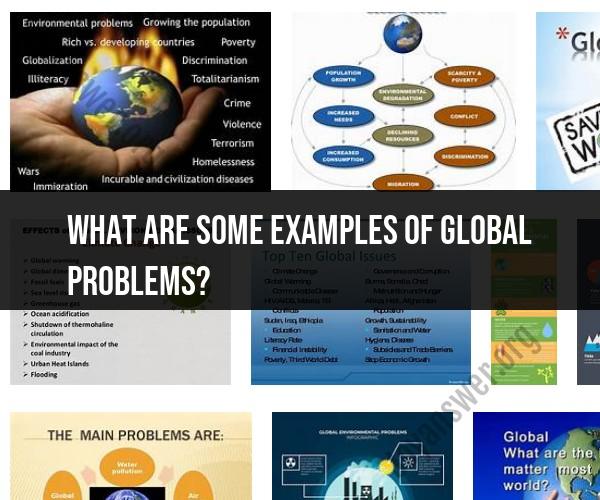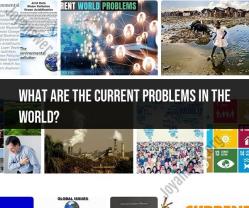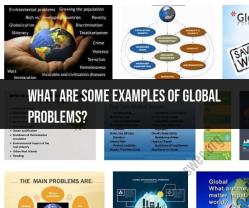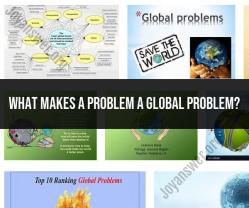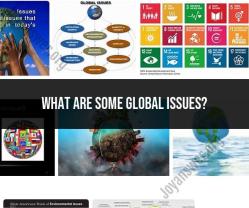What are some examples of global problems?
Global problems, often referred to as worldwide challenges or global issues, are complex issues that transcend national borders and impact people and the planet on a global scale. These problems require international cooperation and solutions. Here are some examples of global problems:
Climate Change: The rise in global temperatures due to greenhouse gas emissions is causing severe impacts, including more frequent and intense heatwaves, rising sea levels, and disruptions to ecosystems and weather patterns.
Biodiversity Loss: The rapid loss of species and ecosystems threatens the stability of the planet's natural systems, affecting everything from food security to human health.
Global Health Crises: Pandemics, such as the COVID-19 pandemic, highlight the interconnectedness of the world's health systems and the need for coordinated responses to health threats.
Poverty and Economic Inequality: Economic disparities between and within countries persist, leading to unequal access to resources, opportunities, and basic needs.
Access to Clean Water and Sanitation: Many people around the world lack access to safe drinking water and proper sanitation facilities, leading to health issues and poverty.
Food Security: Ensuring a stable and equitable food supply for a growing global population is a major challenge, particularly in the face of climate change and resource depletion.
Conflict and Terrorism: Regional and global conflicts, as well as terrorism, pose threats to peace and security, displacing populations and destabilizing regions.
Cybersecurity Threats: Cyberattacks, including those on critical infrastructure and information systems, have the potential to disrupt economies and compromise national security.
Migration and Displacement: Ongoing migration patterns, whether due to conflict, persecution, or environmental factors, require international cooperation to address humanitarian needs.
Human Rights Violations: Human rights abuses, including issues like torture, censorship, and discrimination, persist in many parts of the world, demanding global attention and action.
Nuclear Proliferation: The spread of nuclear weapons and the risk of nuclear conflict are global concerns that require diplomatic efforts and disarmament agreements.
Environmental Pollution: Pollution of air, water, and land affects the health of people and ecosystems worldwide, leading to respiratory diseases, contamination of water sources, and habitat destruction.
Drug Trafficking: The global drug trade fuels crime and violence, impacting societies and economies around the world.
Energy Transition: The shift toward renewable and sustainable energy sources is crucial to combat climate change and reduce reliance on fossil fuels.
Educational Access: Ensuring quality education for all, regardless of geographic location or socioeconomic status, is vital for individual and societal development.
These global problems are interrelated and often require coordinated efforts among nations, international organizations, and civil society to find solutions. Additionally, new challenges may arise as the world evolves, highlighting the ongoing need for global cooperation and problem-solving.
Examples of Global Problems:
- Climate change: The effects of climate change are already being felt around the world, in the form of more extreme weather events, rising sea levels, and changes in plant and animal life.
- Inequality: The gap between the rich and the poor is growing wider, both within countries and between them. This is leading to a number of social problems, such as crime, unrest, and political instability.
- Conflict: There is a lot of conflict in the world today, both within countries and between them. This conflict is often caused by a combination of factors, including poverty, inequality, and political instability.
- Poverty: Over 700 million people around the world live in extreme poverty, meaning that they live on less than $1.90 per day. This lack of access to basic necessities such as food, water, and shelter leads to a number of problems, including malnutrition, disease, and death.
- Human rights abuses: Human rights are violated in many parts of the world. These abuses can include torture, arbitrary detention, and the suppression of dissent.
Global Issues in Action:
- Climate change: In 2023, Pakistan experienced severe flooding that displaced millions of people and caused billions of dollars in damage. This flooding is believed to have been caused by a combination of factors, including climate change and poor water management.
- Inequality: In the United States, the richest 1% of the population now owns more than 40% of the country's wealth. This inequality is leading to a number of problems, such as a decline in social mobility and an increase in political polarization.
- Conflict: The ongoing conflict in Yemen has created one of the world's worst humanitarian crises. Over 20 million people are in need of humanitarian assistance, and millions are facing starvation.
- Poverty: In sub-Saharan Africa, one in three people live in extreme poverty. This poverty is caused by a number of factors, including conflict, disease, and climate change.
- Human rights abuses: In China, the Uyghur Muslim minority is being subjected to a systematic campaign of repression. The Chinese government has been accused of detaining millions of Uyghurs in concentration camps, where they are forced to work and subjected to torture and other abuses.
Global Challenges: Cases and Instances of Global Problems:
- The COVID-19 pandemic: The COVID-19 pandemic is a global challenge that has had a profound impact on the world. The pandemic has caused millions of deaths and disrupted economies and societies around the world.
- The refugee crisis: The world is currently facing a refugee crisis of unprecedented scale. Millions of people have been displaced from their homes due to conflict, persecution, and climate change.
- The food crisis: The war in Ukraine has exacerbated a global food crisis that was already underway. Millions of people are now facing hunger and malnutrition.
These are just a few examples of the global problems facing the world today. These problems are complex and challenging, but they are not insurmountable. By working together, we can find solutions to these problems and create a better future for all.
What can you do to help address global problems?
Here are a few ideas:
- Educate yourself about global problems. The more you know about the challenges facing the world, the better equipped you will be to take action.
- Support organizations that are working to address global problems. There are many organizations working to make the world a better place. You can support these organizations by donating money, volunteering your time, or simply spreading the word about their work.
- Make sustainable choices in your own life. You can help to reduce your impact on the environment and promote social justice by making sustainable choices in your own life. This could involve things like reducing your consumption of resources, eating less meat, and supporting ethical businesses.
By taking these steps, you can help to make a difference in the world.
